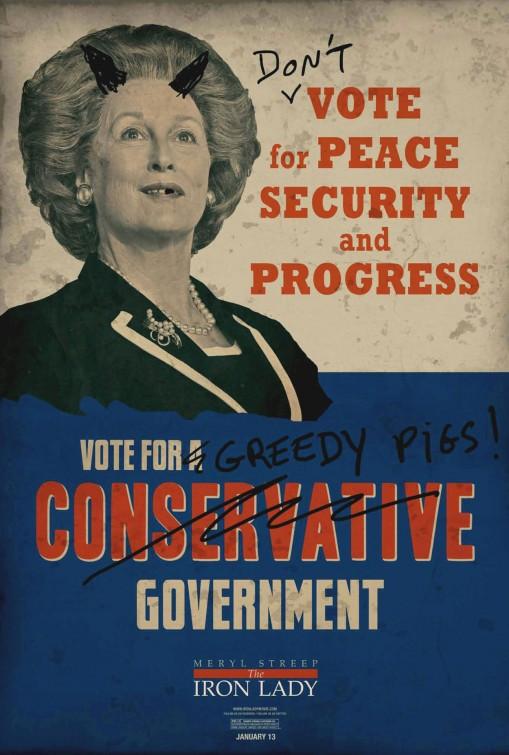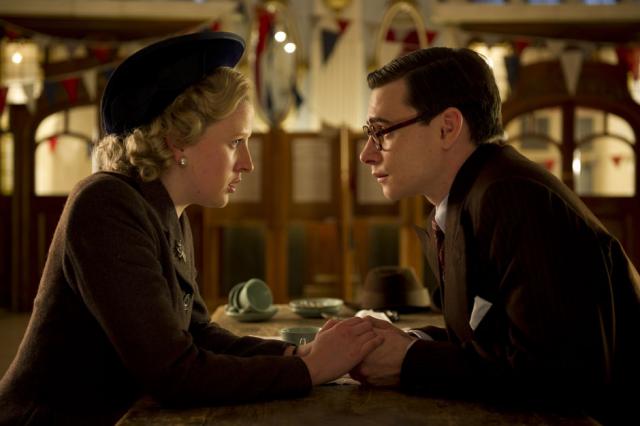The Iron Lady: Why this Golden Globe winner is infuriating so many (but not us)
Auteur: Michael-Oliver Harding
British culture is in the spotlight an awful lot these days. The King’s Speech winning pretty much every possible prize on the film circuit in 2011 set the tone for what soon followed. Then came Stephen Harper’s rebranding of national pride with his campaign to strengthen ties with the British monarchy. And 2011 saw Will and Kate (and the latter’s more flamboyant siblings, Pippa and James) becoming the new cash cows of international gossip rags. That’s without acknowledging that the eyes of the world are slowly turning to London as the city races against the clock in its prep work for the 2012 Summer Olympics. So what better time to release a film based on the life of one of the country’s most divisive – and influential – political figures?
The Iron Lady, which hit theatres Friday, is a fascinating glimpse into the life of woman whose political legacy is still up for debate. The film goes to great lengths to neither celebrate nor condemn the political legacy of Modern Europe’s first female leader – she who spawned the term ‘Thatcherism’ to describe the policies she put forth. Filmmaker Phyllida Lloyd (who, let’s face it, doesn’t have the best track record, having subjected us to that atrocious ABBA musical, Mamma Mia!) boldly chose a narrative structure that finds an elderly, eightysomething Thatcher, now frail and battling dementia, reliving the most pivotal moments of her eventful political career via scattered flashbacks. The film’s timeline shifts back and forth from 2009 to various moments in the past. As contentious as Lloyd’s approach may be, I commend her for having the guts to make a biopic about one of 20th century’s most divisive (and still living) politicians, knowing full well that it would both alienate and infuriate a chunk of its audience.
As for Meryl Streep, she’s beyond great, as you’ve probably read in every single newspaper on the planet. She’s a shoe-in to win Golden Globe, BAFTA, Oscar…the works. The film’s opening sequence, in which a visibly fragile Thatcher ventures out to buy milk at a corner store, sets the tone for the breathtaking performance that follows. Streep meticulously nails the Oxford-educated woman’s every facial tick, poise, posture and phrasing, making you forget you're even watching a thesp at work.

What all the hate is about
If you’re on top of your film news, you’ve probably read all about the widespread criticism of the film – not of Meryl Streep’s sublime performance, of course, but of the script’s many alleged fallacies. Current British Conservative Prime Minister David Cameron even went as far as to question the film’s approach. How often do politicians take a stab at film criticism? Some have argued that a biopic about a once fiery and bold leader, which portrays her as an absent-minded, senile old woman who hallucinates conversations with her long-dead husband, is a tad insulting.
Others argue that for a woman who led such an action-packed career, the film is strangely short on conflict, instead indulging too freely in nostalgia. Others yet feel that her political career is addressed in such a broad, cursory manner that the script could have been adapted from a Wikipedia entry (Ouch!) And let’s not forget about those who are of the opinion that not enough time has passed to properly gauge the influence her strict conservative policies have had on England's history.
All those are valid criticisms, no doubt. Especially if one goes into the film with a laundry list of expectations as to what a Thatcher biopic ought to tackle, how it ought to depict the Iron Lady in question, and what parts of her life should be left on the cutting room floor. But if, like me, you’re going into it without any biopic-related assumptions, you should actually be quite pleased. The film delves into her working class, grocer’s daughter roots, and touches upon (albeit in passing) a number of issues Thatcher contended with while in power: economic unrest, union battles and angry street mobs, a growing terrorist threat, the IRA murder of her closest Conservative party ally, the end of the Cold War, and the war with Argentina over the sovereignty of the Falkland Islands, to name but a few. We also see Thatcher’s deft handling of ‘50s England-era sexism from members of Parliament. But if you’re looking for context to accompany all those events, you’re best to find a BBC doc outlining the lady’s doings.

Young Margaret Thatcher (Alexandra Roach) and Young Denis Thatcher (Harry Lloyd) in The Iron Lady
Refreshingly, the film neither glorifies nor does it vilify the woman who turned her nose up at feminism and socialism. Needless to say, there’s lots for liberal-minded folk to scoff at: all those anti-Soviet, anti-union, anti-gay, privatisation-minded measures she introduced during her 11-year reign. But there’s no denying the woman changed Britain forever. And director Lloyd makes clear that Thatcher was a woman of conviction, who never sought to win any popularity contest and always stood by what she felt was right.
Many Liberals feel it’s too sympathetic a portrayal. Some Conservatives are outraged and embarrassed that one of their most hard-line warriors is depicted as a frail, unwell old woman. How fitting that the film seems to have polarized audiences with as much passion as the woman sharply divided the country during her reign.
The Iron Lady | Now in theatres | theironladymovie.co.uk











